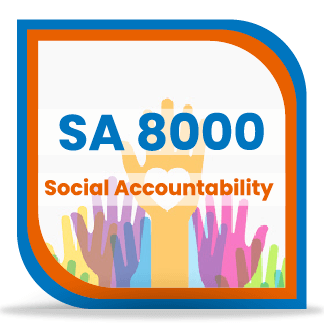Social Accountability
Now a days the SA 8000 is very important. In recent years, there has been a growing worldwide interest in considering ethical and social normative impacts of corporate activities and policies, as well as where products such as developing countries are produced and the working environment. Clients who are interested in these social issues are also increasing. Non-governmental organizations, investment analysts and other stakeholders, including employees, are increasingly evaluating corporate efforts to ensure a fair and equitable working environment and transparent business practices. This means that companies will be asked more to demonstrate social responsibility.

The overview of SA 8000 Certification
The SA 8000 covers all matters including forced and child labor, health and safety in the workplace, Freedom of association & right to collective bargaining, discrimination, disciplinary practices, working hours, remuneration and management systems.
The SA 8000 not only sets workplace standards worldwide, but also covers existing international agreements, including the International Labor Organization, the Universal Declaration of Human Rights and the United Nations Convention on the Rights of the Child. This standard was developed in 1989 by the Social Accountability International (SAI), an organization under the Council on Economic Priorities (CEP), and is considered the world’s most recognized independent workplace standard. As a standard for improving the work environment, it can be applied to companies of all sizes, regardless of scope, industry, or location.The SA8000 is based on the International Labor Organization (ILO)’s Universal Declaration of Human Rights and the United Nations’ International Convention on the Rights of Children. This standard includes a wide range of content, including child labor, forced or compulsory labor, health and safety, freedom of association and right to collective bargaining, discrimination, disciplinary practices, management systems such as working hours, remuneration and supply chain monitoring systems, and external communications and other policies.
SA 8000 Requirements
The SA 8000 standard is based on the ISO 17021-
standard, the same as the existing ISO standard, and is composed of an independent form rather than a high level structure.The purpose of SA 8000 training in Pakistan is to empower and protect all employees of the organization by providing a standard that can be reviewed in accordance with the United Nations Declaration of Human Rights, the ILO and other international labor laws.The requirements for the following nine elements of the SA 8000 are key to proper implementation, monitoring and enforcement. The management system for this enables the organization to improve with complete and continuous compliance with SA 8000 and is an indicator of social performance.The elements of SA 8000 are as follows:
- Child Labor
- Forced or Compulsory Labor
- Health and Safety
- Freedom of Association & Right to Collective Bargaining
- Discrimination
- Disciplinary Practices
- Working Hours
- Remuneration
- Management System
SA 8000 Certification Process
Prime Consultants and Trainers SA 8000 certification process is shown above.For SA 8000 certification, the following must be prepared:
- Be familiar with the requirements. This includes managing legal requirements and comparing existing practices with the requirements of the SA 8000 standard.
- After the comparison is done, the difference can be reduced and the requirements of the standard can be implemented.
- Enforcement procedures must be created and integrated with the company’s existing management systems.
- After applying and completing the internal monitoring process, you can begin the certification process.
The importance of SA 8000
Adoption of the SA 8000 takes into account the social impacts of business operating as well as the conditions under which employees, partners and suppliers operate.The SA 8000 is universally applicable to any type of organization, regardless of size, geographic location or industry.The SA8000 is a voluntary social responsibility compliance standard that demonstrates a company’s commitment to a humane work environment and responsible production.The benefits of complying with this standard include:
- Demonstrate that the employment relationship between enterprises and workers operates fairly and lawfully in accordance with international norms.
- Improve supply chain management and performance.
- Ensure compliance with global standards and reduce the possibility of non-compliance, disclosure and litigation.
- Demonstrate appropriate social responsibility when bidding for overseas contracts or expanding locally to accommodate new businesses.
Estimated effectiveness of SA 8000
As shown in the figure, SA 8000 certification is in high demand in many countries, including China, India, and Italy, and its importance is emerging in developing countries as well.Companies in the textile and clothing are getting certifications, and companies in various fields including architecture, food, consumer goods and infrastructure, are also getting certifications.Other estimated effectiveness for SA 8000 certification are as follows.
- It is possible to prove that the employment relationship between companies and workers operates fairly and lawfully in accordance with international norms.
- Possible to respond to domestic and international demands for corporate social responsibility
- Demonstrate compliance with social responsibility for suppliers, suppliers, subcontractors, etc.
- Systematic access to social issues

Prime’s competency
Prime Consultants and Trainers enables you to validate SA 8000, an international standard for corporate maintenance and application, to meet customer expectations and improve your performance.Working with our experienced auditors to implement the most globally recognized workplace standards, you will be able to demonstrate social responsibility in contract bidding and organization expansion.In addition, obtaining certification through cooperation with Prime Consultants and Trainers can improve performance processes, enhance useful talent, a consistent and appropriate supply chain, and more sustainable customer relationships, and provide a more profitable competitive advantage.
